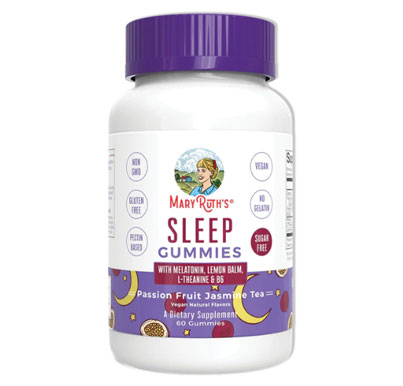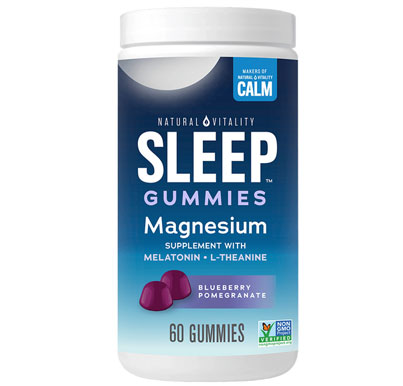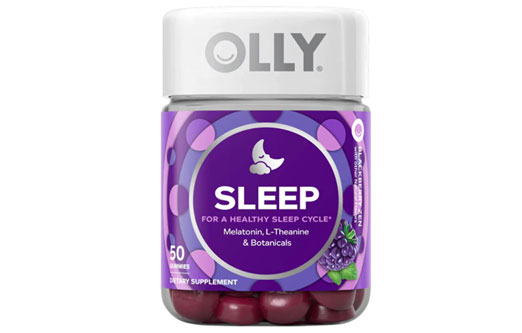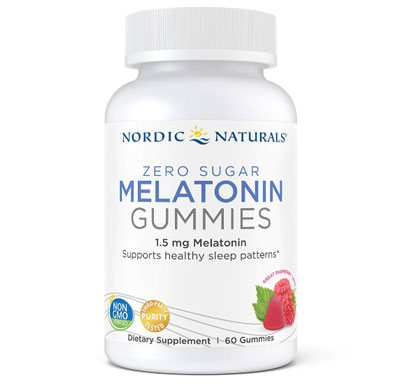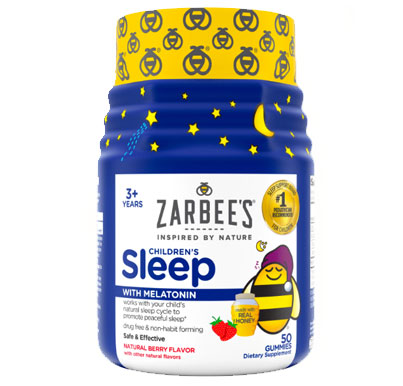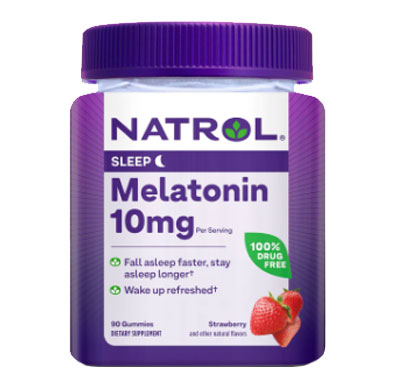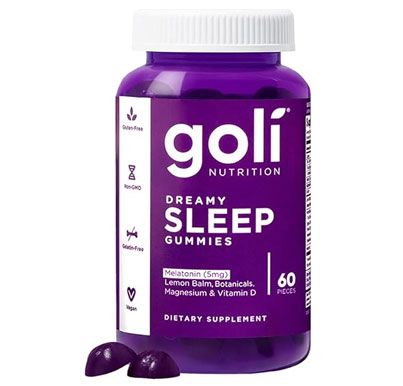Melatonin is a hormone that helps regulate your sleep-wake cycle. While we naturally produce this hormone, some people may choose to use melatonin supplements to help facilitate sleep better if they’re struggling to doze off.
Melatonin supplements are available in many forms, but melatonin gummies are a popular pick because they often taste good and are easier to take. Plus, the best melatonin gummies typically contain effective doses of the hormone, making them just as effective as other forms.
In this guide, we’ll share the best melatonin gummies available right now, along with a comprehensive buying guide on how to choose the best one for you.
Overview
Best Melatonin Gummies
- Mary Ruth’s Melatonin Sleep Gummies – Editor’s Pick
- Natural Vitality Sleep Gummies – Best Melatonin Gummy for Taste
- Olly Sleep Gummies – Best Value Melatonin Gummy
- Nordic Naturals Zero Sugar Melatonin Gummies – Best Sugar-Free Melatonin Gummy
- Zarbees Children’s Sleep with Melatonin Gummies – Best Melatonin Gummy for Kids
- Natrol Melatonin Gummies 10 mg – Best Extra-Strength Melatonin Gummy
- Goli Dreamy Sleep Gummies – Best Low-Dose Melatonin Gummy
How We Chose the Best Melatonin Gummies
To come up with our list, we consulted the expertise of our writer, Lindsay Boyers, a functional nutritionist.
Learn more: Our Sleep Supplements Methodology.
Best Melatonin Gummies for 2024
Mary Ruth’s Melatonin Sleep Gummies – Editor’s Pick
Why Mary Ruth’s Earned Editor’s Pick
Many melatonin gummies can have sub-par ingredients and too much sugar, but the Mary Ruth Melatonin Sleep Gummies stand out because they’re sugar-free and contain only natural ingredients. They also contain 5 milligrams of melatonin per two-gummy serving, which is on the high end of the effective dose range1 for adults.
In addition to melatonin, these gummies contain vitamin B6, L-theanine, and lemon balm extract, three other active ingredients that can boost melatonin production2, promote relaxation3, and help reduce anxiety and stress4.
Another reason these gummies stand out is that they’re made with pectin instead of gelatin. This makes them suitable for vegan consumers since traditional gummies are not vegan-friendly. They’re also gluten-free, dairy-free, nut-free, and soy-free to accommodate a wide range of dietary restrictions and preferences.
Mary Ruth also offers a happiness guarantee so you can try the supplement for 30 days to see if it works for you. If it doesn’t, you can send it back for a store credit (or exchange it for something else).
What Are Mary Ruth’s Melatonin Gummies Made Of?
Mary Ruth’s Melatonin Sleep Gummies contain four active ingredients: melatonin, vitamin B6, L-theanine, and lemon balm extract. They’re sweetened with a combination of sugar alcohols (maltitol, erythritol, and xylitol) and organic stevia. They also contain natural flavors and colors, plus pectin, citric acid, sodium citrate, and organic sunflower oil, which contribute to texture and shelf-life.
Our Take: We like the Mary Ruth Melatonin Sleep Gummies because they contain an effective dose of melatonin without added sugar. They’re also suitable for a wide range of dietary restrictions, so they could work well for many people.
What We Liked
- Contains supportive ingredients – In addition to melatonin, this supplement contains vitamin B6, L-theanine, and lemon balm extract, which can work together to help you sleep.2, 3, 4 This can make it more effective than melatonin-only supplements.
- Doesn’t contain any sugar – Most melatonin gummies have a gram or two of sugar, but these contain only non-nutritive sweeteners. This keeps the sugar, carb, and calorie count lower.
Potential Drawbacks
- Only available in one flavor – There’s only one flavor, and it’s a little out of the box. We would love to see more common flavor choices.
- Contains sugar alcohols – While this supplement doesn’t have any sugar, it does contain maltitol, which may cause an upset stomach in some people. Usually, this is with much higher doses, though.
Customer Reviews of Mary Ruth’s Melatonin Sleep Gummies
Mary Ruth’s Melatonin Gummies have a rating of 4.7 out of 5 stars on the brand’s website. Customers love the clean ingredient list and say they’re highly effective, but some aren’t huge fans of the taste.
Natural Vitality Sleep Gummies – Best Melatonin Gummy for Taste
Why Natural Vitality Earned Best Melatonin Gummy for Taste
Natural Vitality, which has been around since the 1980s, has a whole supplement line that’s designed to help calm you down and support sleep. Because of this, it’s safe to say that the company knows a thing or two about effective ingredients.
These Sleep Gummies combine 3 milligrams of melatonin with 50 milligrams of magnesium citrate and L-theanine, an amino acid that helps promote relaxation5, and the supplement is third-party tested and NSF-certified to verify this potency and the purity of ingredients.
In addition to this transparency, one thing that really makes these melatonin gummies stand out is the taste. They come in a blueberry pomegranate flavor that reviewers say tastes great and doesn’t leave any sort of aftertaste; many compare them to candy. They’re also soft and chewy, which makes them easier to take.
We also like that Natural Vitality offers a 60-day money-back guarantee — one of the most generous of all the brands we recommend. You can try the gummies for up to two months and return them for a refund if you don’t like them.
What Are Natural Vitality Sleep Gummies Made Of?
All of Natural Vitality’s supplements are made with natural ingredients. This specific one has a pretty short ingredient list that includes 50 milligrams of magnesium citrate, 3 milligrams of melatonin, 50 milligrams of L-theanine, organic tapioca syrup, organic sugar, water, pectin, citric acid, natural flavors and colors, and organic sunflower oil. The formulation was changed recently so these are now gluten-free, vegan-friendly, and non-GMO.
Our Take: We named the Natural Vitality Sleep Gummies the best-tasting one because reviewers rave about the flavor and texture. These gummies also contain a combination of relaxation-promoting ingredients.
What We Liked
- Tastes good – Some gummies can have an aftertaste or undesirable texture, but many reviewers say this one tastes great. If this is an important quality for you in a melatonin gummy, that’s a good indication this could be a viable option for you.
- Organic sweeteners – While these gummies do have sugar, both of the sweeteners (tapioca syrup and sugar) in them are organic. There are no artificial sweeteners in addition to these.
Potential Drawbacks
- Only one flavor – While many reviewers say it tastes good, there’s only one flavor to choose from. We’d love to see some more options.
- Lower dose than some others – These gummies have 3 milligrams of magnesium per serving. This should be in an effective range for adults, but some consumers may be interested in something with a slightly higher dose.
Customer Reviews of the Natural Vitality Sleep Gummies
These gummies have a 4.5 out of 5 average rating on the brand’s website. While some reviewers say they taste too sweet, most like the flavor and texture and say they work well without making you feel groggy in the morning.
Olly Sleep Gummies – Best Value Melatonin Gummy
Olly Sleep
Many gummy supplements are sub-par, but Olly Sleep has high-quality ingredients and an effective dose of melatonin without too much added sugar.
Olly Score
4.10 / 5
Why Olly Sleep Earned Best Value Melatonin Gummy
You have to be discerning when it comes to lower-cost supplements. You want to save some money but not at the expense of quality. With the Olly Sleep Gummies, you can have the best of both worlds.
These gummies break down to just 52 to 56 cents per serving, depending on which size you get (ordering the larger bottle brings the cost down a bit). For reference, that’s about 30 percent less expensive than the Mary Ruth gummies, our Editor’s Pick item. If you want to save even more, you can subscribe to a recurring shipment for another 15 percent off.
However, despite their lower price, they’re still made with high-quality ingredients, and Olly doesn’t skimp on third-party testing — these gummies are certified by the NSF so you know you’re getting exactly what the label says you are.
Each serving is two gummies and this provides 3 milligrams of melatonin, which is well within the effective dose range, along with other calming active ingredients like lemon balm extract, L-theanine, chamomile extract, and passionflower extract. This combination could help improve sleep quality, promote relaxation, and reduce anxiety and insomnia6.3, 4
What Are Olly Sleep Gummies Made Of?
Olly Sleep combines five active ingredients: melatonin, lemon balm extract, L-theanine, chamomile extract, and passionflower extract. In addition to these active ingredients, this gummy contains glucose syrup, beet sugar, water, gelatin, natural flavors, citric acid, natural coloring, pectin, vegetable oil, and carnauba wax. Since these gummies are sweetened with glucose syrup and beet sugar, they have 2 grams of added sugar per serving.
Our Take: The Olly Sleep Gummies are budget-friendly without sacrificing quality. They have an effective melatonin dose, other highly effective active ingredients, and a natural ingredient list.
What We Liked
- Lower cost per serving – These gummies are about 30 percent less expensive than our Editor’s Pick selection without sacrificing quality. You can save even more money on them if you subscribe to a recurring delivery.
- Natural ingredients – While these gummies do contain two forms of sugar, all of the ingredients are natural. There are no artificial colors or flavors.
Potential Drawbacks
- Contains added sugar – Each serving contains 2 grams of added sugar. While this is par for the course with many gummy supplements, it’s worth mentioning for those who prefer a sugar-free version.
- Made with gelatin – Because this melatonin gummy is made with gelatin, it’s not suitable for vegans. Those who want to avoid animal-based ingredients will need to find a gummy made with pectin.
Customer Reviews of the Olly Sleep Gummies
The Olly Sleep Gummies have an average of 4.5 out of 5 stars on Amazon. Customers say they help them fall asleep faster, but some reviewers report they wake up three or four hours into the night.
Nordic Naturals Zero Sugar Melatonin Gummies – Best Sugar-Free Melatonin Gummy
Why Nordic Naturals Earned Best Sugar-Free Melatonin Gummy
While many gummies contain sugar or a blend of artificial sweeteners, the Nordic Naturals Zero Sugar Melatonin Gummies are sweetened only with xylitol — a sugar alcohol that does not affect blood sugar levels7. Because of this, they have zero grams of added sugar and are suitable for those who are monitoring blood sugar levels, as well as anyone who prefers to limit sugar intake.
We also like these because melatonin is the only active ingredient. While the synergistic blend of botanicals and minerals in some of the others can be helpful, some people may just want a pure melatonin supplement — and that’s what you get here.
At first glance, these gummies may seem like they provide a much lower dose than some of the others, but Nordic Naturals lists the serving size as one gummy; most others use a two-gummy serving. They’re in line with the others we recommend when comparing them, gummy for gummy. Two gummies provide 3 milligrams of melatonin.
What Are Nordic Naturals Melatonin Gummies Made Of?
Nordic Naturals uses only natural ingredients, and this supplement is certified vegan and non-GMO. The ingredient list includes melatonin, xylitol, soluble tapioca fiber, purified water, pectin, natural flavor, citric acid, fruit and vegetable juice for color, sodium citrate dihydrate, sunflower oil, and carnauba wax. All ingredients and potencies are verified through third-party testing.
Our Take: We like the Nordic Naturals Zero Sugar Melatonin Gummies because they replace sugar with xylitol, a sugar alcohol that doesn’t have a negative effect on your blood sugar.7 There are no artificial sweeteners.
What We Liked
- No sugar – The sugar-free formulation is one of the biggest draws of these melatonin gummies. There are still 2 grams of carbs per serving, but zero grams of added sugar and 1 gram of fiber.
- Natural ingredient list – In addition to being sugar-free, these gummies are all-natural and don’t contain artificial sweeteners, colors, flavors, or preservatives.
Potential Drawbacks
- May have an aftertaste – Because they’re sweetened with xylitol, some people may experience an aftertaste. Many describe it as cooling or minty.
- Contains xylitol – Xylitol is a sugar alcohol that’s extremely toxic to dogs. You’ll have to use extra care to keep these out of reach of your four-legged friends.
Customer Reviews of the Nordic Naturals Zero Sugar Melatonin Gummies
There aren’t too many reviews on the brand’s site, but the Nordic Naturals Zero Sugar Melatonin Gummies have a 4.7 out of 5-star average rating. Some customers say they don’t like the taste and texture, but others say they work great and the benefits of having no sugar outweigh any of the cons.
Zarbee’s Children’s Sleep with Melatonin Gummies – Best Melatonin Gummy for Kids
Why Zarbee’s Earned Best Melatonin Gummy for Kids
You should talk with your pediatrician before giving melatonin to your kids, but once you get the all-clear, we like the Zarbee’s Children’s Sleep with Melatonin Gummies. These gummies have melatonin as the single active ingredient, and it’s in a dosage that’s suitable for children: 1 milligram per gummy.
These gummies are also allergen-friendly, so they’re safe for children with dietary restrictions. They’re made without all major allergens, including milk, eggs, fish, shellfish, tree nuts, peanuts, wheat, soy, and sesame, and they’re gelatin-free.
We also like that they’re available in two flavors, berry and watermelon, so if your kids are picky, you’re more likely to find one that appeals to their tastes.
The one downside is that Zarbees isn’t clear on their testing process. While the company says they have a five-step testing and safety process, it doesn’t look like they outsource to third-party labs, so there’s no real way to verify purity and potency. Still, Zarbee’s has been a well-known brand since 2008.
What Is Zarbee’s Children’s Sleep Made Of?
The Zarbee’s Children’s Sleep has a straightforward ingredient list. The gummies are made with melatonin, honey, sucrose, glucose syrup, water, pectin, natural flavors, sodium citrate, and fruit and vegetable juice for color. Each gummy has 1 milligram of melatonin so you can dose appropriately depending on your child’s age.
Our Take: The Zarbee’s Children Sleep Gummies are a little high in sugar, but we think the natural ingredient list and low-dose melatonin outweigh this. Plus, the sugars are natural forms.
What We Liked
- Low dose – At 1 milligram per gummy, these have a low dose that’s appropriate for children ages 3 and up. If your child needs more, they can take two gummies.
- Two flavor choices – Unlike most other gummies on the list, these come in two flavor choices. This gives your kids more options.
Potential Drawbacks
- Contains added sugar – There are three types of added sugar in these gummies (honey, sucrose, and glucose syrup). At 2 grams per gummy, they have more total sugar than the others on the list.
- No official third-party testing – While Zarbee’s has a multi-step testing process, they’re not certified by any major third-party organizations, like the NSF or Informed Choice.
Customer Reviews of Zarbee’s Children’s Sleep with Melatonin Gummies
The Zarbee’s Children’s Sleep with Melatonin Gummies have 4.7 out of 5 stars on the brand’s website. Reviewers say they’re gentle, taste good, and don’t cause any side effects, but some don’t like the added sugar.
Natrol Melatonin Gummies 10 mg – Best Extra-Strength Melatonin Gummy
Why Natrol Earned Best Extra-Strength Melatonin Gummy
The Natrol Melatonin Gummies are our pick for Best Extra-Strength because they contain 10 milligrams of melatonin per two-gummy serving. This means you can get twice as much melatonin as the Mary Ruth’s Melatonin Sleep Gummies, our Editor’s Pick, without increasing the number of gummies you have to take.
In addition to this, these gummies use only natural ingredients and don’t contain any artificial flavors, sweeteners, preservatives, or synthetic dyes. They’re also non-GMO.
Further, all of this is verified through regular third-party testing, so you know that you’re actually getting a higher dose and clean ingredients. Natrol manufactures their supplements in cGMP-certified facilities and is NSF-certified.
Despite the higher dose, they’re still generously priced. While the price varies depending on which size bottle you get, you can expect to pay around 67 cents per gummy, which is in line with the lower-dose options.
What Are Natrol Melatonin Gummies Made Of?
The Natrol Melatonin Gummies contain only one active ingredient: melatonin. This is probably your best bet with a high-strength gummy, since you don’t want to increase the risk of interactions with any other active ingredients. It also has a clean ingredient list that includes tapioca syrup, cane sugar, water, citric acid, coconut oil, carnauba wax, fruit and vegetable juice, natural flavors, pectin, and sodium citrate.
Our Take: We like the Natrol Melatonin Gummies because the higher dosage is verified through NSF certification. Melatonin is also the only active ingredient, so there’s less of a risk of interactions.
What We Liked
- Only one active ingredient – With a high-dose supplement, we prefer to stick to one active ingredient. This one has only 10 milligrams of melatonin.
- Reasonably priced – Extra-strength supplements typically cost more, but this one is in line with other, lower-dose supplements. You can expect to pay around 67 cents per gummy, depending on which size you buy.
Potential Drawbacks
- Not for new users – Each gummy contains 5 milligrams of melatonin, so these aren’t a great choice for new melatonin users.
- Higher chance of side effects – While melatonin is generally safe, higher doses are still more likely to cause side effects. If side effects do occur, they’re usually mild.
Customer Reviews of the Natrol Melatonin Gummies
The Natrol Melatonin Gummies have a 4.2 out of 5-star average on the brand’s website. Some reviewers say the taste isn’t great, but they work quickly and have led to much deeper, more restorative sleep.
Goli Dreamy Sleep Gummies – Best Low-Dose Melatonin Gummy
Why Goli Earned Best Low-Dose Melatonin Gummy
If you’re new to melatonin, you may want to try a lower-dose option, like the Goli Dreamy Sleep Gummies. We like these gummies because they contain just 2.5 milligrams of melatonin per serving, and since a serving is two gummies, you can drop that dose even more to 1.25 milligrams by taking one gummy. This is a great starting dose for people who are new to melatonin or for those who prefer not to take too much at one time.
They’re suitable for all types of diets — they’re vegan, non-GMO, gluten-free, and gelatin-free — and they’re made in the U.S. in allergen-free facilities (and free of all major allergens). The facilities are also cGMP-certified, so there is a rigorous level of oversight involved in their production that can give you some peace of mind about their potency and quality.
Because they’re sweetened with sugar and tapioca syrup, they contain 2 grams of added sugar per serving, which is pretty standard for sugar-sweetened gummies.
What Are Goli Dreamy Sleep Gummies Made Of?
The Goli Dreamy Sleep Gummies are all-natural. In addition to melatonin, these gummies contain vitamin D, magnesium citrate, lemon balm extract, and a proprietary herbal blend that combines chamomile extract, passionflower extract, and tart cherry powder.
While most studies are on the juice and not the powder, there is some evidence that tart cherries can help regulate circadian rhythm and boost sleep quality8. In addition to the active ingredients, these gummies also contain cane sugar, tapioca syrup, water, pectin, natural flavor, citric acid, sodium citrate, malic acid, and fruit and vegetable juices for color.
Our Take: The low dosage of this supplement is a draw, but that’s not the only reason we like it. It’s also made with natural ingredients and made in allergen-free, cGMP-certified facilities in the U.S.
What We Liked
- Lower dose than others – Each serving contains just 2.5 milligrams of melatonin, instead of 3 to 5 milligrams. Also, because a serving is two gummies, you can take just one to lower the dose even more.
- Contains other effective ingredients – In addition to melatonin, these gummies contain lemon balm extract and tart cherry powder. These ingredients have also been shown to help promote relaxation and better sleep quality.4, 8
Potential Drawbacks
- Some don’t like the texture – Some reviewers say the gummies are sticky and clump together. These can make them harder to get out of the bottle, especially if they get warm.
- Other active ingredients may not be for everyone – In addition to botanicals, these gummies contain vitamin D and magnesium. If you’re not looking for extra vitamin and mineral supplementation, they may not be the best option for you.
Customer Reviews of the Goli Dreamy Sleep Gummies
While all customer reviews aren’t posted on the brand’s website, the Goli Dreamy Sleep Gummies have an average of 4.3 out of 5 stars from more than 3,000 reviews on Amazon. Customers say they taste amazing and work well, but some have issues with the gummies sticking together, so make sure to keep them out of the heat.
What Are the
Benefits of Melatonin?
The most well-known benefit of melatonin is improved sleep. There are many studies looking at melatonin’s effects on sleep and the circadian rhythm and, collectively, these studies suggest that melatonin can:
- Reduce the amount of time it takes to fall asleep9 (sleep latency)
- Increase total sleep time9
- Enhance overall sleep quality10
- Help with symptoms of jet lag11.
Melatonin is also an anti-inflammatory12, so it could help combat chronic inflammation and neutralize free radicals, while also helping to reduce insulin resistance.
Are Melatonin Gummies Safe?
Yes, based on research13, melatonin gummies are generally considered safe for most healthy adults, even in higher doses. If adverse effects do occur, they’re usually mild. The most common are dizziness, sleepiness, nausea, and headache.
If you have any underlying health conditions, or you’re taking medications, talk to your doctor before taking a melatonin supplement. There’s some research14 showing that melatonin can interfere with the effectiveness of some blood pressure-lowering medications.
Are Melatonin Gummies Safe for Kids?
There’s less research on melatonin use for kids, but the available studies show that short-term use of melatonin is generally considered safe for healthy children and those with chronic sleep conditions15.
The key word here, though, is short-term. Some research suggests that long-term use of melatonin can delay the onset of puberty16, especially if melatonin supplements are taken during this time. Because of this, it’s important to work with your pediatrician to make sure the dosage and timing of melatonin is appropriate for your child.
There are some additional caveats, too. Melatonin should not be used as a standalone solution for kids; instead, it should be combined with cognitive-behavioral therapy and improvements in sleep hygiene.
Additionally, you should not give melatonin to kids with immune disorders17 or who are currently on immunomodulating medications.
Because melatonin gummies look (and often taste) like candy, you’ll also want to be extra careful about storing them out of reach of kids. According to a report from the Centers for Disease Control and Prevention (CDC), unintentional melatonin ingestion among children under the age of five increased as much as 530 percent18 between 2012 and 2021.
Are Melatonin Gummies Effective?
There isn’t any definitive research comparing different types of oral melatonin, but it’s assumed that melatonin gummies are effective for sleep19, as long as the specific brand you choose has been third-party tested to ensure potency and efficacy.
Learn more: Do Melatonin Gummies Work?
When Should You Take Melatonin Gummies?
Research shows that, when taken orally, melatonin reaches peak concentration in about 60 minutes20. Because of this, you should take melatonin gummies an hour before your bedtime.
Should You Take Melatonin Gummies Every Day?
Daily use is okay in the short term, but Johns Hopkins Medicine21 recommends only taking melatonin regularly for one to two months and then seeing how your sleep is. If you’re still having trouble after a couple of months, you may want to see a sleep specialist for more targeted care.
How to Choose a
Melatonin Gummy Supplement
Dosage
Melatonin gummies are available in a wide range of dosages, and the right one for you depends on why you’re taking melatonin and how your body processes it. In general, a typical effective dose for adults ranges from 1 to 5 milligrams.1
Some melatonin gummies offer as much as 10 milligrams of melatonin per serving, but a higher dose doesn’t necessarily mean it’s more effective.
It’s generally recommended to start with a low dose22 to see how it works for you, and then gradually increase your intake from there, if needed.
Flavor
Flavor is a personal preference, but it’s something to consider when choosing a gummy. Melatonin gummies come in many different flavors, from berry to passion fruit with jasmine tea. When deciding between them, you might want to factor in which flavor you like best.
Sugar Content
Unlike capsules or tablets, melatonin gummies typically contain sugar or some sort of sweetener to make them more palatable. While a little bit isn’t a big deal, consuming too much added sugar during the day can negatively affect sleep quality23.
Aim for no more than 1 to 2 grams of sugar per serving. If you want to avoid added sugar completely, look for no-sugar gummies that are sweetened with stevia, monk fruit, or sugar alcohol instead.
Other Active Ingredients
Some melatonin gummies only have one active ingredient: melatonin. But others, especially those that are marketed as general sleep supplements, may have several, like vitamin B6, magnesium, L-theanine, and/or lemon balm, to name a few.
These active ingredients will typically be listed on the label, so read them thoroughly to make sure it’s what you want. In some cases, active ingredients can work synergistically, making the supplement more effective. For example, vitamin B6 has been shown to boost the production of melatonin, while L-theanine can help reduce stress and anxiety, making it easier to fall asleep.2, 4
However, if you only want melatonin, double-check the label so you know exactly what you’re getting.
Third-Party Endorsements
Because melatonin is classified as a dietary supplement, it’s not regulated by the FDA24. This means the onus is on the supplement company to verify what’s in their products. Some companies take this duty seriously, seeking optional third-party testing to help verify potency and purity. Others opt out of third-party testing, which makes it harder to determine if the supplement label actually matches what’s inside.
When choosing a melatonin gummy, it’s best to buy products that have third-party certification from well-known programs, like the U.S. Pharmacopeia25 (USP) and NSF International26.
You can also look for more specific third-party endorsements, like the NSF Certified for Sport and/or Informed Choice, which indicate that the supplement has been tested for contamination and banned ingredients and found to be safe.
Effectiveness
There’s no way to know with 100 percent certainty that a supplement will be effective for you, but there are some things you can look for to increase the likelihood.
For starters, you want to choose a supplement with a science-backed dosage. For melatonin gummies, that means around 1 to 5 milligrams of melatonin for most adults. If you’re an older adult, you may want to bump that up to the 1 to 6-milligram range. Children and adolescents should take 0.5 to 3 milligrams and 3 to 5 milligrams, respectively.1
That said, you can’t always take the label claims at face value. When it comes to melatonin specifically, research shows that the concentration of the supplement can range from -83 percent to 478 percent27 of what’s actually listed on the label.
For this reason, you’ll want to look for third-party testing from a reputable lab. This will ensure that the supplement contains the listed concentration of melatonin and that it’s not contaminated with any unknown ingredients.
Potential Side Effects
Melatonin gummies are considered safe for short-term use, but they can cause side effects, especially in higher doses28. To reduce the risk of potential side effects, start with gummies with smaller doses, around 1 milligram per serving, and work your way up, as needed.
While some extra-strength melatonin gummies have 10 milligrams per serving, 1 to 5 milligrams is enough for most adults.1 Targeting this range should make side effects less likely.
In addition to paying attention to dosages, read through customer reviews to see if there are repeated mentions of side effects. While a small subset of people may experience dizziness or nausea, you shouldn’t be seeing an alarming number of reports. If you do, it could be a sign of contamination or improper labeling.
Manufacturing Process
Not all companies are forthcoming about their manufacturing processes, but you can look for clues that they follow regulated guidelines. A Current Good Manufacturing Practice29 or cGMP certification is the gold standard for manufacturing.
While the FDA doesn’t regulate melatonin gummies directly, it oversees these regulations, which ensure high-quality manufacturing. To get, and maintain, a cGMP certification, the FDA regularly inspects the facilities where supplements are made to ensure quality and safety.
In addition to this certification, you might also want to look for transparency from the brand itself. Do they provide information about where their raw materials come from and where supplements are made? The more information a company is willing to provide, the better.
Price
Instead of looking at the total cost of a melatonin supplement, you want to consider the cost per serving, since bottle sizes can vary. The melatonin gummies we recommend range from about 52 cents per serving to 75 cents per serving, which you can generally expect to spend on high-quality melatonin gummies. If you’re looking at a supplement that’s much more or less than that, you may want to reconsider.
You don’t want to overpay, but you also don’t want to get the cheapest supplement you can find. If you do, you risk sacrificing quality and verification through third-party testing.
Customer Experience
You can learn a lot about a supplement, and the company that manufactures it, by reading through unbiased, firsthand reviews. Before deciding on a melatonin gummy, read what other customers had to say about their experiences.
Are there any major complaints about the product or supplement? Does the company respond in a timely manner? Do they work to resolve complaints? These are all questions you should find the answers to before purchasing from a company.
Don’t just rely on the company’s website for customer reviews, since they have more control over what gets published there. Instead, dig through Amazon reviews and third-party sites like TrustPilot for the most accurate representation of the overall customer experience.
Brand Reputation
Along the same lines as customer experience, you also want to think about the brand’s reputation. Is the company well-known with a good track record of making high-quality products? Are there any complaints against the company with the Better Business Bureau (BBB)?
Before purchasing from a company, dig into the history of the brand to see if any red flags come up. If they do, you might want to purchase from a different brand.
How to Increase
Melatonin Naturally
While supplements can provide an exogenous source of melatonin, they don’t actually get to the root cause of the issue. For long-term relief, you may want to make some lifestyle changes to help increase your natural production of melatonin. Here are some things you can try.
- Dimming lights at night – Melatonin production is highly light-dependent. Levels of melatonin decrease when you’re exposed to light, and increase when it gets dark. Because of this, exposure to too much light at night can reduce melatonin production30 and make it harder for you to fall asleep. To combat this, use dim, warm lights at night as much as possible. You can also consider putting blackout curtains on your windows, unplugging electronic devices at night, and keeping phones and TVs out of your bedroom.
- Turning off screen devices before bed – Research shows that exposure to screens, especially right before bed, can decrease melatonin production31 and negatively affect sleep quality. Independent of blue light exposure, too much screen time32 can also lead to poor sleep. While there’s no official guideline for when to cut off screen use, the American Academy of Ophthalmology33 recommends ditching screens at least 1 to 2 hours before bed. This means turning off the TV, putting your phone down, and shutting your laptop down. If you can’t avoid screens, switch to night mode as it gets dark in the evening. Research shows that, when compared to blue light, the warmer light can reduce melatonin suppression by as much as 93 percent34.
- Consume more melatonin-rich foods and beverages – Some foods and drinks naturally contain melatonin or compounds, like serotonin and tryptophan35, that can affect melatonin production. These foods include36 eggs, fish, milk, nuts, mushrooms, dark green vegetables, cherries, tart cherry juice, pineapple, and bananas. Try to include as many of them in your diet as possible.
Frequently Asked Questions
Which melatonin is the most effective?
One small study suggests that extended-release melatonin supplements37 may be more effective than immediate-release formulations because they stay in your body longer and more closely mimic the actions of naturally occurring melatonin. But it also comes down to dosage. Research shows that supplements that contain between 1 and 5 milligrams of melatonin per serving are most effective for adults.1
Is 10mg of melatonin too much?
A dose of 10 milligrams of melatonin per day is likely safe, but you don’t necessarily need that much. Lower dosages can be just as effective as higher ones, and most doctors recommend taking between 0.3 to 5 milligrams38 before bedtime.
If you’re new to melatonin, it’s best to start with a lower dose and gradually increase intake as needed, based on recommendations from your doctor.
Do melatonin gummies really work?
Yes, melatonin gummies contain effective doses of melatonin, which has been found to reduce sleep latency, improve sleep quality, and increase total sleep time.9, 10 Melatonin doesn’t always work for everyone though, and it’s a good idea to combine supplementation with lifestyle changes that can help increase your brain’s production of melatonin naturally.

Lindsay Boyers
Functional Nutritionist, Content Writer
About Author
Lindsay Boyers is a functional nutritionist with extensive experience in sleep, supplements, and other areas of health and wellness. She is also currently taking a sleep science certification course.
Lindsay has been testing, and writing about, products across all wellness and lifestyle categories for the past four years. She has personally tested over two dozen mattresses, and countless other sleep products.
Her work has been featured in Forbes, Sports Illustrated, US News & World Report, CNET, CNN Underscored, The Spruce, Healthline and more.
Combination Sleeper
References:
1. Bueno, Ana Paula Rosinski., et al. “Regulatory aspects and evidences of melatonin use for sleep disorders and insomnia: an integrative review”. Arquivos de Neuro-Psiquiatria. 2021.
2. Picone, S., et al. “A solution based on melatonin, tryptophan, and vitamin B6 (Melamil Tripto) for sedation in newborns during brain MRI”. Italian Journal of Pediatrics. 2019.
3. Rao, Theertham P., et al. “In Search of a Safe Natural Sleep Aid”. Journal of the American College of Nutrition. 2015.
4. Ghazizadeh, Javid., et al. “The effects of lemon balm (Melissa officinalis L.) on depression and anxiety in clinical trials: A systematic review and meta-analysis”. Phytotherapy Research. 2021.
5. Hidese, Shinsuke., et al. “Effects of L-Theanine Administration on Stress-Related Symptoms and Cognitive Functions in Healthy Adults: A Randomized Controlled Trial”. Nutrients. 2019.
6. Guerrero, Fructuoso., Medina, Graciela., et al. “Effect of a medicinal plant (Passiflora incarnata L) on sleep”. Sleep Science. 2017.
7. Wölnerhanssen, Bettina., et al. “Metabolic effects of the natural sweeteners xylitol and erythritol: A comprehensive review”. Critical Reviews in Food Science and Nutrition. 2020.
8. Chung, Jinwook., et al. “Effects of Short-Term Intake of Montmorency Tart Cherry Juice on Sleep Quality after Intermittent Exercise in Elite Female Field Hockey Players: A Randomized Controlled Trial”. International Journal of Environmental Research and Public Health. 2022.
9. Ferracioli-Oda, Eduardo., et al. “Meta-analysis: melatonin for the treatment of primary sleep disorders”. PLOS One. 2013.
10. Xie, Zizhen., et al. “A review of sleep disorders and melatonin”. Neurological Research. 2017.
11. Cingi, Cemal., et al. “Jetlag related sleep problems and their management: A review”. Travel Medicine and Infectious Disease. 2018.
12. Cardinali, Daniel., et al. “Melatonin’s Benefits and Risks as a Therapy for Sleep Disturbances in the Elderly: Current Insights”. Nature and Science of Sleep. 2022.
13. Andersen, Lars Peter Holst., et al. “The Safety of Melatonin in Humans”. Clinical Drug Investigation. 2016.
14. Tuft, Colin., et al. “Current Insights into the Risks of Using Melatonin as a Treatment for Sleep Disorders in Older Adults”. Clinical Interventions in Aging. 2023.
15. Goldman, Ran., et al. “Myths and Evidence Regarding Melatonin Supplementation for Occasional Sleeplessness in the Pediatric Population”. Pediatric Annals. 2021.
16. Boafo, Addo., et al. “Could long-term administration of melatonin to prepubertal children affect timing of puberty? A clinician’s perspective”. Nature and Science of Sleep. 2019.
17. Janjua, Irvin., Goldman, Ran., et al. “Sleep-related melatonin use in healthy children”. Canadian Family Physician. 2016.
18. Lelak MD, Karima., et al. “Pediatric Melatonin Ingestions—United States, 2012–2021”. Centers for Disease Control and Prevention. Last updated June 3, 2022.
19. Goins, Sonya. “Mayo Clinic Minute: What are the benefits, risks of sleeping with melatonin gummies?”. Mayo Clinic. 2023.
20. Tordjman, Sylvie., et al. “Melatonin: Pharmacology, Functions and Therapeutic Benefits”. Current Neuropharmacology. 2017.
21. “Melatonin for Sleep: Does it Work?”. Johns Hopkins Medicine. Last accessed February 25, 2024.
22. “Melatonin: How Much Should You Take?”. Cleveland Clinic. Last updated March 13, 2022.
23. Alahmary, Sarah., et al. “Relationship Between Added Sugar Intake and Sleep Quality Among University Students: A Cross-sectional Study”. American Journal of Lifestyle Medicine. 2022.
24. Savage, Rosemary., et al. “Melatonin”. StatPearls. Last modified August 8, 2022.
25. “USP Verified Mark”. U.S. Pharmacopeia. Last accessed February 25, 2024.
26. “What is NSF Certification?”. National Science Foundation. Last accessed February 25, 2024.
27. Erland, Lauren A E., Saxena, Praveen K. “Melatonin Natural Health Products and Supplements: Presence of Serotonin and Significant Variability of Melatonin Content”. Journal of Clinical Sleep Medicine. 2017.
28. Schrire, Zoe Menczel., et al. “Safety of higher doses of melatonin in adults: A systematic review and meta-analysis”. Journal of Pineal Research. 2022.
29. “Facts About the Current Good Manufacturing Practice (CGMP)”. Centers for Disease Control and Prevention. Last updated February 16, 2024.
30. Gooley, Joshua J., et al. “Exposure to Room Light before Bedtime Suppresses Melatonin Onset and Shortens Melatonin Duration in Humans”. The Journal of Clinical Endocrinology and Metabolism. 2011.
31. Green, A., et al. “Evening light exposure to computer screens disrupts human sleep, biological rhythms, and attention abilities”. Chronobiology International. 2017.
32. Hartley, Sarah., et al. “Do both timing and duration of screen use affect sleep patterns in adolescents?”. PLOS One. 2022.
33. Porter, Daniel. “Digital Devices and Your Eyes”. American Academy of Ophthalmology. Last updated November 27, 2023.
34. Teran, Emiliano., et al. “Evaluation of Two Strategies for Alleviating the Impact on the Circadian Cycle of Smartphone Screens”. Optometry and Vision Science. 2020.
35. Pereira, Gabriela Amorim., et al. “Relationship between food consumption and improvements in circulating melatonin in humans: an integrative review”. Critical Reviews in Food Science and Nutrition. 2022.
36. Meng, Xiao., et al. “Dietary Sources and Bioactivities of Melatonin”. Nutrients. 2017.
37. Mun, Jonathan G., et al. “A Randomized, Double-Blind, Crossover Study to Investigate the Pharmacokinetics of Extended-Release Melatonin Compared to Immediate-Release Melatonin in Healthy Adults”. Journal of Dietary Supplements. 2024.
38. “What is Melatonin?”American Academy of Family Physicians. Last updated August 2023.
